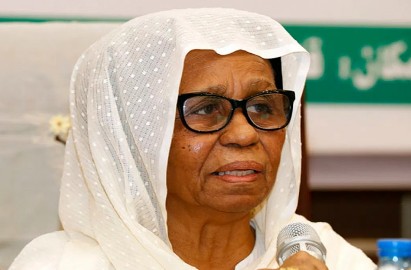Ex-member of Sudan’s Sovereign Council says resignation meant to reject humiliation
May 22, 2021 (KHARTOUM) – Aisha Musa, a former member of the Sovereign Council harshly criticized the Transitional Government in Sudan and branded it with failure to provide services and achieve justice.

Her resignation took place one day after the killing of two civilians in a peaceful rally to commemorate the second anniversary of a bloody attack by the security forces on a pro-democracy sit-in on 3 June 2019.
In a statement she read in a video released by the official news agency on Saturday, the former representative of the civil society groups in the Sovereign Council revealed the reasons that prompted her to resign.
She started by apologizing to the Sudanese women saying that they “still suffer exclusion” and do not participate in decision-making. Also, she apologized to the mothers of the protesters’ dead and wounded, for her decision to quit the transitional authority.
She further stressed that her resignation aimed at expressing “a refusal to participate in more humiliation of our gigantic people,” she said.
She pointed out that her efforts for justice and to defend women rights did not yield any results because her points of view were ignored and while the military component exceeded their constitutional powers.
“The civilian component in the Sovereign Council and at all levels of government became merely a logistical executive body that does not participate in decision-making – but endorse pre-prepared decisions.”
The Sovereign Council is chaired by the Sudanese army commander in chief Abdel Fattah al-Burhan until next November and then he should be replaced by a civilian, as it was agreed in the constitutional text governing the transitional period.
Aisha criticized the Council of transition partners formed after the peace agreement adding that it led to “diminishing the joint meetings of the cabinet and Sovereign Council and the ruling coalition.”
This situation led to the concealment of efforts to form the transitional parliament, adding that this step is a breach of the Constitutional Document and without logical justifications, she said.
“The weakness in the state institutions led to the extension of insecurity and the inability to regulate and monitor the military forces, so the second blow of 11 May came stronger, more painful and let us down,” she said.
Al-Burhan role in the leadership of the Transitional Sovereign Council has been contested by several political forces. However, he was encouraged by the divisions among the Forces for Freedom and Changes, his willingness to normalize relations with Israel and the border dispute with Ethiopia.
Also, Hamdok’s nonchalant manner in peace and justice issues infuriated some political forces but others said the FFC’s weakness was to blame.
Musa called to reform the justice system, implement the death sentence against some killers of demonstrators and investigate the reasons for delaying the publication of the findings of the investigation committee on the 3 June attack.
In a statement issued on 19 May, Human Rights Watch denounced the use of excessive force against protesters on 11 May.
The rights groups said the attack on civilians shows the urgent need for security sector reforms, and to end immunity provisions that shield officials from accountability.
“Sudan’s international partners should see to it that Sudan’s leaders turn their pledges to action when it comes to upholding a rights-abiding transition,” said Laetitia Bader, Horn of Africa director at Human Rights Watch.
(ST)
